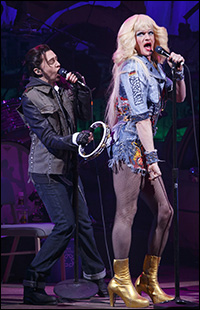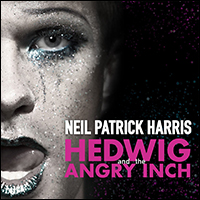
*
Broadway favorite (and four-time former Tony Awards host) Neil Patrick Harris is back on stage in director Michael Mayer's new production of Stephen Trask and John Cameron Mitchell's impassioned rock musical, which charts the journey of a transsexual "internationally ignored songstress." Playbill.com takes you through each track of the show's brand-new cast recording, which features Harris and Hall alongside their fantastically raucous on-stage band the Tits of Clay, which consists of Justin Craig, Matt Duncan, Tim Mislock and Peter Yanowitz.
*
"America the Beautiful"
Overtures are so not punk rock, so Hedwig starts with a rock 'n' roll shred guitar version of "America the Beautiful" as our transsexual songstress heroine descends from the rafters. The track is less than a minute, but it gives listeners a first introduction to Hedwig's gender-bending bandmate Yitzhak, played by Lena Hall, who begins with, "Ladies and gentlemen — whether you like it or not — Hedwig!" "Tear Me Down"
Yitzhak is described as a former drag queen that Hedwig has forced to present in masculine attire. As such, he acts as a kind of emcee during the show's hard-rocking opening number, "Tear Me Down," which gives Neil Patrick Harris a first opportunity to truly own the stage and show off some attitude. The song alludes to the erection of the Berlin Wall in 1961 as a hated Cold War-era symbol of division. Yitzhak's spoken-work interlude at 1:42 announces that, "Hedwig is like that wall, standing before you in the divide between east and west, slavery and freedom, man and woman, top and bottom."
"The Origin of Love"
This track, which starts out softly and builds, borrows its bones from a speech from Plato's Symposium, turning the story of the origin of love into a tune with an almost Seussian sensibility (also reflected on stage in this production's animations by Benjamin Pearcy and 59 Productions). According to the story, people originally roamed the earth as four-legged creatures like "like two men [or two women, or a man and a woman] glued up back to back" until the gods split them in two out of spite. Now, supposedly, we're all left searching for our other halves. Listen at 2:25 for the moment when Harris' hitherto subdued performance breaks wide open as the song reaches its climax.
"Deutschlandlied"
Clocking in at just ten seconds, this track provides a guitar-and-drums transition into the segment of the show in which Hedwig discusses her childhood as a young "slip of a girlyboy" — then named Hansel — in East Berlin, who grew up obsessed with rock 'n' roll.
| |
 |
|
| Lena Hall and Neil Patrick Harris | ||
| Photo by Joan Marcus |
One day, young Hansel falls for a U.S. soldier named Luther Robinson. Luther, who presents him with a package of gummy bears he can't refuse, opens up possibilities he'd never considered. Luther even suggests Hansel try dressing in drag in order to fit their love into the gender binary he's used to as an army man. Listen at 2:45 to hear Lena Hall as Yitzhak's spot-on monologue (as Luther). With a new hard rock arrangement (less countrified than past versions) and its refrain of "Come on, sugar daddy, bring it home," the song is a powerhouse for Harris and a chance for him to interact with the audience when the song is performed on stage (as he did when he performed this number on the Tonys).
"When Love Explodes" (Love Theme from Hurt Locker: The Musical)
The first major production of Hedwig was at the Jane Street Theatre downtown, which presented a grungier aesthetic for the show. To make the show feel at home on a Broadway stage, the creative team devised the premise that Hedwig's show takes place on the disused set from the musical version of "The Hurt Locker," which purportedly closed the night before. They've even given us a taste of the show's love theme, as sung here by Yitzhak.
"Angry Inch" Ultimately, Hedwig comes to the conclusion that the only way for Hansel to leave East Berlin with Luther is to "leave a little piece of himself behind" by way of a sex-change operation. Unfortunately, Hedwig's sex change "got botched," leaving her with an "angry inch," as she calls it. The song represents a powerful, angry moment for Hedwig as she explains her past. Harris shines on the track, wailing "six inches forward and five inches back" with raw energy. It's also a chance for the band (Tits of Clay) to shine.
"Wig In a Box"
What cruel irony! Hedwig does end up in the U.S. — in Junction City, Kansas. But on the one-year anniversary of their nuptials, Luther leaves her, on the same day as the fall of the Berlin Wall. Hedwig is left in pain and despair, but her mood picks up as soon as she's "pulling a wig down from the shelf" in this jaunty number. All of a sudden, she's living in fantasy world like her pop idols (Farrah Fawcett gets a shout-out at 3:20). Onstage, Hedwig leads a sing-along in front of a wall of wigs; listeners can get a taste of the effect at home at 3:52.
| |
 |
|
| Lena Hall | ||
| Photo by Joan Marcus |
As a means of recovery, Hedwig forms a band called the Angry Inch and befriends a young Christian army brat named Tommy Speck, whom she dubs Tommy Gnosis (for greater, more godlike dramatic effect). One of the Angry Inch's tunes is this track, a piano-driven reflection on Hedwig's doomed relationship with Tommy, who eventually betrays her by stealing her songs and breaking out on his own as a pop star. The premise of the production has Hedwig performing at the Belasco Theatre while a Tommy Gnosis concert rages in Times Square, so he's literally (well, figuratively) feet away as she sings this song.
"The Long Grift"
Because Hedwig is too angry to sing it, Yitzhak takes on the task of singing this tune, an incrimination of Tommy, whose misdeeds continue to haunt "internationally ignored songstress" Hedwig. "I'm just another dollar," Yitzhak sings, "that you made in your long, long grift." Listen in awe as Lena Hall blows the roof of the song shortly after the 2:00 mark.
"Hedwig's Lament"
In a quieter moment of introspection, Hedwig — backed by only piano chords — rehashes her gender-bridging past. "I gave a piece to my mother," she sings. "I gave a piece to my man. I gave a piece to the rock star; he took the good stuff and ran."
"Exquisite Corpse"
"Oh, God, I'm all sewn up," Hedwig sings as this thrash-infused track begins. The title of the song comes from a method of creating art whereby different artists add to a collaboration in turns blindly (without looking at the piece as a whole until it's completed). The song's lyrics reflect Hedwig's frustration as a creation or sorts, sewn together in pieces — also echoing back to the concept of being split from (and in constant search of) our other halves in "The Origin of Love." Harris's no-holds-barred approach to the song makes it one of the best (and most punk rock-infused) tracks on the album.
| |
 |
|
In a startling onstage transformation, Harris transforms into Gnosis during the show's final segment for a reprise of "Wicked Little Town." On disc, it's not too different from the first iteration of this song on the album besides from being slightly more pop-inflected, but there's no harm in having two versions of such a great song.
"Midnight Radio"
In the show's finale, which builds from a slow burn to a triumphant climax, Hedwig comes to some manner of understanding about herself — "shining like the brightest star, a transmission on the midnight radio." Hedwig gives shoutouts at 1:54 to "Patti and Tina and Yoko, Aretha, and Nona and Nico" and herself, and Yitzhak has a chance, at 3:54, to wail along with the song's final refrains of "Lift up your hands," having been freed of his constraints by Hedwig and allowed to be fully himself — in drag. Hall's and Harris's impassioned final wails represent a great end to a well-produced, well-sung cast recording.










